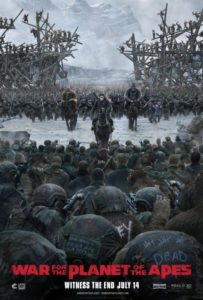 Dull, ponderous, pretentious, and bloated, War for the Planet of the Apes continues the tradition of Apes movie sequels growing worse and worse the more of them they churn out.
Dull, ponderous, pretentious, and bloated, War for the Planet of the Apes continues the tradition of Apes movie sequels growing worse and worse the more of them they churn out.
Rise of the Planet of the Apes (’11) was a refreshing new beginning, showing a world of do-gooder humans oblivious to their selfishness and cruelty setting in motion the end of the world.
Dawn of the Planet of the Apes (’14) brought the new society of smart apes into conflict with a human civilization almost wiped out by plague. It begins well enough, but turns muddled and tiresome by the end. Caeser is unconscious for the last third of the movie and war is begun without him. He’s the main character, but has no agency in moving the story forward.
War for the Planet of the Apes takes the worst of Dawn and expands on it.
Fair warning, what follows is highly spoilery.
I don’t know that I’ve ever seen a movie in which every line of dialogue is exposition. It’s quite a feat. Characters say exactly what they think and feel, explain everything that is happening and that is going to happen, keep no secrets, make no plans, use no subterfuge, and keep the audience guessing not at all.
There is not one single second of this movie where you don’t know everything about everyone, where you don’t know everything that’s happening and that’s going to happen.
“I am mad at you because you killed my wife and son,” says Ceasar (Andy Serkis) to the Colonel (Woody Harrelson) when asked. Says the Colonel, “I hate apes and I will you kill you all because if I don’t, there will be no humans left. Here, let me tell you my backstory.” I am barely paraphrasing. Every exchange in the movie is exactly the same.
Is it because the apes are made to speak in monosyllables that the capacity for complex thought has been denied them?
Caesar, who at the end of the movie is explicity (and inexplicably) turned into Moses, is once again robbed of any agency. The plot is a bizarre backtracking from the end of Dawn, the villian is revealed to be toothless—an enemy to humans and apes alike!—and Caesar does nothing at all except suffer. Maybe he should have been Jesus instead?
Dawn ends with what appears to be the beginning of the ape/human war. War begins fifteen years later. The war has been raging, we’re told at the outset, and it’s troubled times for apekind. We’re introduced to Caeser after a nasty sneak attack on an ape compound. Caesar lets their human captives go with a message for the Colonel: He wants apes to be left alone in the forest. They won’t bother humans if humans don’t bother them.
So…we’re back to Dawn. Caesar wants peace, the humans want war. One wonders what Caesar’s been doing the past fifteen years. Not killing any humans? Being a nice ape? Why does he think, after fifteen years of war, he can just ask nicely to be left alone? Why hasn’t he changed as a character after fifteen years of warfare?
Turns out the Colonel is a bad Colonel whose army of ape killers is itself being hunted by the rest of the army, who I guess are good humans? Let’s call them gooder humans. They still want to kill apes, but not before they kill the Colonel.
Caesar’s wife and son are whacked by the Colonel to get things rolling. What would the movie do with his wife, anyway? There are no female characters in War, ape or human, save one ape who gets a few sign-language lines, and one adorable little human girl, whose purpose is to be adorable (perhaps the one unqualified success of the movie). Only male apes fight in this world, so too male humans.
Caesar, realizing the humans will never let them live in peace, sends all the apes away from the forest in search of, beyond the mountains—the desert! Hooray! Apes love deserts, you guys. This is going to be a very smart move. But sure, the original Planet of the Apes finds the apes living in a desert, I guess it’s time to hurry them into it.
Caesar himself, much to everyone’s consternation, isn’t coming. He’s got to find the Colonel first. He’s not above a good revenge killing. A few other apes join him. On the way they come across the adorable little girl (Amiah Miller)—who’s mute. She’ll later be named Nova, which suggests the world of the original Apes movie begins about fifteen years after this one ends? (Nova is the one who shacks up with Charlton Heston, you’ll recall.) Not only that, but Caesar has another son, a young one named Cornelius. Also a big character as an adult in the original.
I always imagined a lot of evolution came between the present and the original Planet of the Apes. Like thousands of years. Turns out Charlton Heston only made it about thirty years into the future. Not much of a trip after all.
So Caesar hunts down the Colonel, all the while grappling with himself over his desire to seek revenge. Is he in fact just like Koba? One might hope so. At least Koba had a clear idea of what he wanted and how to get it. Caesar doesn’t seem to know how or why to do anything.
When at last Caesar gets his chance to kill the Colonel, the Colonel has been infected with the newest mutation to the human virus—this one makes you mute. Along with his war on apes, he’d been trying to kill off the infected humans, lest all humanity be reduced to the state of animals, and now look at him! Infected and mute. He takes Caeser’s gun and holds it to his own head—he’s suicidal.
And Caesar, after a mighty internal struggle, doesn’t shoot him.
This couldn’t be a weaker scene. First, Caeser is presented with the easiest possible form of his dilemma—whether or not to kill in anger. If the Colonel weren’t already suicidal, if he was as mean a bastard as he’d been, would Caesar have backed off? I doubt it. He’s barely able to back off as it is. So what has Caesar really proven about himself? Not much.
Even less than not much, because no sooner has he chosen the way of peace than his enemy shoots himself. Caesar gets exactly what he wanted and can pretend there’s no blood on his hands.
There’s a kind of Apocalypse Now remake overlaid on the movie. APE-POCALYPSE NOW is written in chalk on a wall, Harrelson is called the Colonel, and I guess the apes are the Viet Cong? Ha ha, Kong. Beyond the references to Apocalypse, it’s not clear what message the similarities are supposed to send. When at the end the movie switches to Biblical allegory, it’s more confusing still.
Andy Serkis give another fine performance as Caesar the glowering ape, but he’s hampered by the flat, soulless dialogue, as is everyone. Harrelson’s best scene is his introduction, before he says a word.
No one has anything of interest to say. Scenes go on at incredible length. The self-importance is off the charts. I am at a loss, to be honest. I am obviously at odds with War‘s critical assessment at large, which isn’t exactly a new place to find myself, but this one feels especially baffling. What is this lumbering slog doing for people? I spent the first half stifling laughter so as not to annoy the rapt (sleepy?) viewers sitting next to me. The second half I fought to keep my eyes open.
These Apes movies have gone completely off the rails. I can’t even tell what the theme is. Apes good, man bad? Is that it? Maybe that’s it, and I should just be happy no one with a cape shows up to save the day.

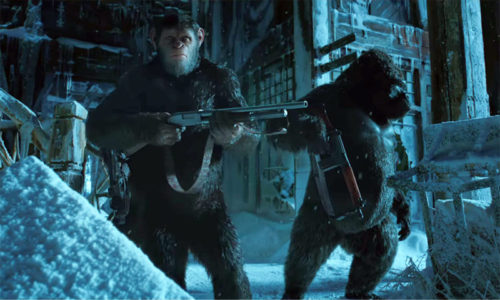
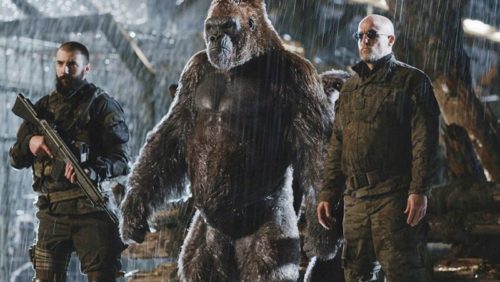
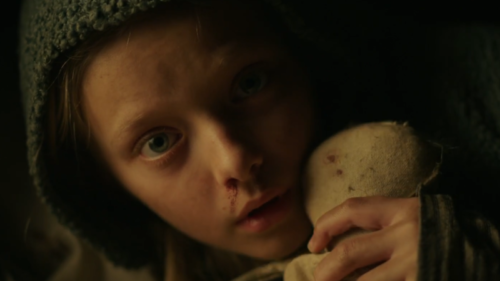
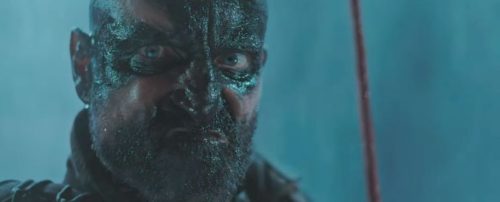
My cape is in the dryer. I’ll be there soon.
I watched this last night. It was balls. I thought the first five minutes looked good and then I sort of enjoyed Steve Zahn’s character, because I sort of always enjoy a Steve Zahn character, but the rest was complete and utter pants.
Dull, dire, and as engaging as router instructions.
I did, after all, warn you. But I respect your decision to watch terrible movies you’re almost certain will in fact be terrible. I do it all the time.